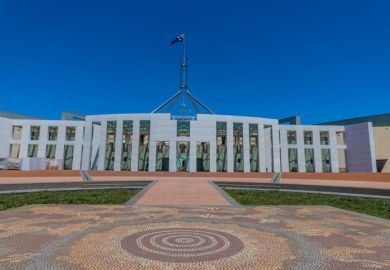While Australian vice-chancellors relinquished millions of dollars to help universities and students weather the Covid-induced financial crisis, the pandemic will only temporarily interrupt the inexorable growth of their outsized pay packets.
Seven-figure earnings could again be the norm this year, with austerity measures to curtail executive pay – typically through salary cuts or renunciation of performance bonuses – already a thing of the past at most institutions.
This means that average vice-chancellor remuneration exceeding A$1 million (£540,000), a benchmark that the sector exceeded in 2019, could re-emerge as earnings plummet from the overseas tuition fees that fuelled such high pay. Experts expect 2022 to be a crunch year for Australian international education because of a dearth of fresh enrolments in 2020 and 2021.
Institutional accounts released so far show that 11 vice-chancellors earned more than A$1 million last year, down from 15 in 2019. But five annual reports are yet to be published, including three from universities that paid their leaders more than A$1 million in 2019.
Unprecedented turnover has also affected vice-chancellors’ salaries, with 13 universities changing leaders last year. Part-year pay tipped the earnings of three university chiefs below the A$1 million mark, while termination benefits elevated the package of another departing vice-chancellor to seven figures.
Of 19 universities that have not undergone recent leadership changes, 10 reduced their vice-chancellors’ remuneration while seven increased it and two left it unchanged. Overall executive pay rose at 17 universities last year, declining at 15.
All but a handful of vice-chancellors – and many other university executives – accepted pay cuts to alleviate their institutions’ financial problems or students’ suffering. Most university leaders relinquished between 10 and 30 per cent of their earnings, either taking pay cuts or diverting money into scholarship or hardship funds.
Other vice-chancellors refused bonuses or pay increases, with some combining all these measures. Their contributions are not necessarily reflected in 2020 institutional accounts because the donations came from take-home pay or because bonus payments fell due in 2021.
Some contributions were substantial. University of Technology Sydney vice-chancellor Attila Brungs gave about A$200,000 to struggling students and staff. Deakin University boss Iain Martin relinquished 25 per cent of his salary and contributed a further A$40,000 to Deakin’s student emergency assistance fund.
At the University of Melbourne, senior managers returned 20 per cent of their income – almost A$9 million – to institutional coffers. A year earlier, they contributed almost A$16 million to a student residence and scholarship programme.
But with such gestures expiring at the end of 2020 or mid-2021, normal executive pay arrangements have resumed at most institutions. Macquarie University accounting professor James Guthrie said that governing councils had missed an opportunity to reset vice-chancellors’ remuneration.
Professor Guthrie said it was a mistake for universities to benchmark executive salaries against each other, because “everyone’s in the floating boat. You’re benchmarking with someone else who’s floated up in salary.”
The pandemic will permanently lower leaders’ pay at a handful of universities. The University of Sydney, whose former boss Michael Spence was Australia’s most generously remunerated vice-chancellor, will pay successor Mark Scott at least 23 per cent less.
The Australian National University’s Nobel laureate vice-chancellor Brian Schmidt accepted a A$90,000 pay cut when he was reappointed last year, making him the lowest-paid head of any public university.
Register to continue
Why register?
- Registration is free and only takes a moment
- Once registered, you can read 3 articles a month
- Sign up for our newsletter
Subscribe
Or subscribe for unlimited access to:
- Unlimited access to news, views, insights & reviews
- Digital editions
- Digital access to THE’s university and college rankings analysis
Already registered or a current subscriber?








